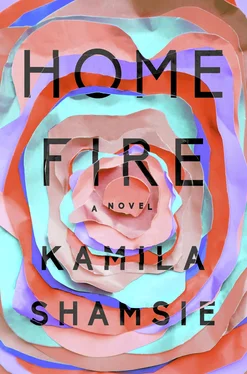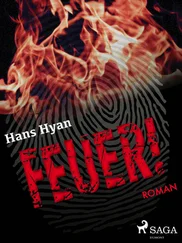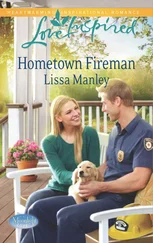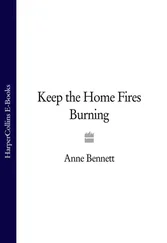Parvaiz set Nat’s phone down on the weighing scale, surprised by how light it was. In his hands it had felt like an iron bar. He’d taken it out of the pocket of Nat’s winter coat, which hung in the back room, when Nat went to the café next door for his morning toast and tea. He’d switched the browser into private mode and typed “Bagram abuse” into the search bar. Then he’d read, and looked at images, until he’d had to run outside and throw up in an empty crate that smelled of cabbage.
He’d always told himself a story, which came from nowhere he could now recall, that said Guantánamo was the place where really bad things happened, and at least his father had been spared that. Such a clever little lie, neat as the piles of fruit and vegetables he’d so carefully arranged this morning, as if the placement of a pear were something that mattered.
Nat returned, took one look at him, and said, “What’s happened?”
Parvaiz stood up. “Not feeling well. Can I go?”
“Of course. Should I call Isma? You need something from the pharmacy?”
He shook his head, unable to bear Nat’s kindness.
A short while later he was at Farooq’s flat. He walked over to the shackles, lifted their weight in his hand. The cool steel harmless in his palm, link clinking against link.
“Tie me again. I want to feel my father’s pain.”
“My brave warrior,” Farooq said, as Parvaiz knelt down and waited for the agony to resume.
||||||||||||||||||
“Are you finally ready to tell me about her?” Aneeka said, perched on the arm of the sofa, her foot tapping against Parvaiz’s ankle inquiringly as he lay prone beneath his favorite blue blanket, a hot water bottle against his back.
“Her who?”
“Really? You going to tell me you aren’t lying here looking so wounded because of whoever you’ve been going off to meet every afternoon and texting deep into the night for — what — a couple of weeks now? Longer? Who is she? Why all the secrecy?”
“Why the law?”
“What?”
“Why is that what you’ve decided to do with your life? What does the law count for? How did the law help our father?”
She raised her eyebrows at him, unbothered. “You could just say you aren’t ready to tell me who she is. Is she married? Oh god, she’s not from one of those crazy honor-killing type families, is she?”
“Why are you pretending I’m not asking you a valid question?”
“Well, you aren’t, really. What has Adil Pasha ever had to do with our lives?”
He turned away from her, his face pressed against the sofa cushions. “You’re just a girl. You don’t understand.”
She held his foot in her hands, pressing her thumbs into his sole. “Don’t get your heart broken.”
“Shut up. Leave me alone. You don’t know anything.”
||||||||||||||||||
A few days later there was a fund-raiser for the library campaign. Parvaiz had been involved with the campaign through his adolescence, ever since the council had announced that the local library, to which his mother had taken him and Aneeka after school at least once a week, would have to close. He’d handed out leaflets, written letters to the local newspaper, attended meetings with Gladys where strategies were discussed; when it became clear the council was going to go ahead with the closure he’d seamlessly moved into the next stage of the campaign, to set up and keep going a volunteer-run library. He’d sung carols outside the tube station to raise money, helped transport books local residents donated, volunteered at the library every Sunday. But as the day of the fund-raiser drew closer, he became increasingly worried that one of the Us Thugz boys might see him at the cake stall with Gladys, selling Aneeka’s chocolate brownies, Aunty Naseem’s Victoria sponge, and Nat’s apple pie, and report back to Farooq that with the world ablaze with injustice Parvaiz Pasha thought the cause to which he should devote his time was a local library. The only way to limit the damage was to break the news himself.
He found Farooq ironing in his underpants, the windows of the flat thrown open to allow in the sunshine of the unseasonably warm day and the chicken-grease-scented air. A pile of freshly laundered clothes lay in a basket near his feet. Squares of sunlight fell like epaulets on his chiseled shoulders. He was in a boisterous mood, instructing Parvaiz how to roll up the ironed clothes, asking him if he knew that was the best way to keep them from creasing, and deriding the “idiots” who chose to fold instead. Parvaiz found himself imagining Farooq working with Isma at the dry-cleaning store, swapping tips about stain removal.
Tentatively, Parvaiz mentioned the library campaign, which he described as a “habit” carried over from adolescence. Farooq upended the iron and pointed to a spot in the center of the ironing board.
“Put your hand there. Palm up. I’m going to press this iron on it.”
Parvaiz looked from the hissing iron to Farooq’s face, but there was no hint of a joke. Just a watchfulness, a judgment waiting to be made. He stepped forward, placed both palms on the ironing board, forced himself into stillness as Farooq lifted the iron, feinted, smiled when Parvaiz didn’t flinch, then lightly touched the wedge-shaped weapon to Parvaiz’s palms. It was hot but not unbearable.
“Uses steam pressure more than heat. It won’t burn even the flimsiest silk,” Farooq said, with the air of a salesman. He caught Parvaiz by the back of the neck and kissed his forehead. “My faithful warrior.” He resumed his ironing, and Parvaiz jammed his hands into his pockets.
“The library,” Farooq said. “Of course it matters. Same as what they’re doing to the NHS, welfare benefits, all the rest of it. You know this country used to be great.”
“When was that?”
“Not so long ago. When it understood that a welfare state was something you built up instead of tearing down, when it saw migrants as people to be welcomed not turned away. Imagine what it would be like to live in such a nation. No, don’t just smile. I’m asking you to do something: imagine it.”
Parvaiz shook his head uncertainly, not sure what he was being asked.
“There is a place like that we can go to now. A place where migrants coming in to join are treated like kings, given more in benefits than the locals to acknowledge all they’ve given up to reach there. A place where skin color doesn’t matter. Where schools and hospitals are free, and rich and poor have the same facilities. Where men are men. Where no one has to enter haram gambling shops to earn a living, but can provide for his family with dignity. Where someone like you would find himself working in a state-of-the-art studio, living like a prince. Your own villa, your own car. Where you could speak openly about your father, with pride, not shame.”
Parvaiz laughed. He’d never seen Farooq so light, so playful. “So what are we still doing here? Let’s follow the yellow brick road, or is it the White Rabbit who takes us there?”
“What rabbit? What are you talking about rabbits for when I’m trying to tell you something serious.”
“Sorry. You’re talking about a real place?”
“You know where I’m talking about. The caliphate.”
Parvaiz raised his hands defensively. “Come on, boss. Don’t mess with me.”
Farooq switched off the iron, stepped into cargo pants, pulled on his T-shirt. “I’ve been there. I’d just come back from there when we met. Who are you going to believe about what it’s really like? The same people who said Iraq had weapons of mass destruction, the ones who tortured your father in the name of freedom, or me?”
Parvaiz’s heart seemed to have taken up his entire chest cavity, hammering so furiously he was surprised his shirt wasn’t moving. Farooq’s expression became gentle.
Читать дальше












